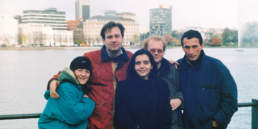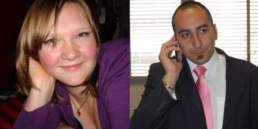
In its series “15 years ago” the Golden Oldie looks back to special moments in the history of AEGEE. Today, in its first instalment, we look back to the first and only Working Group Congress, which took place on 30th November and 1st December 1996 in Enschede. The highlight of the event was the founding meeting of the Cultural Working Group (CWG). The Key to Europe reported about the event.
Multicultural teams bring more chances than risks
Enschede, 30/11-1/12 1996. For the first time in AEGEE history a congress about all Working Groups (WG) is held. “Think Europe – A new approach to contemporary issues” is the title of the event, which is attended by sixty people from ten different countries. The goal was to improve the “thematical backbone” of AEGEE, as WGs are called, and to involve new people in their projects.
“Think Europe” consisted of a theoretical and a practical part. Lectures about international co-operation were followed by team building games. The Working Groups presented their subjects, whereafter the participants were divided in little teams that developed new events about east-west and north-south relationships, education, human rights and the environment.

Working Groups are international teams of people with different cultural backgrounds. This was stressed in a lecture on Global Management by Mr Prud Homme van Reine (Free University of Amsterdam) and Ms Foong (Tokyo). They focused on examples of the business world: companies have to change their management style when they operate in another culture. International companies or student organisations have to combine their global management with local custom and to accept the presence of tensions.
“The advantages of working in multicultural teams should outrage the problems”, stressed Ms Tina Girnnt from the University of Brabant. The high input of ideas and new abilities and the tight bond after putting away the cultural differences make a winning team. “The royal route is to recognise the misinterpretations and to explain each other’s behaviour.”

A general introduction in organising an event was given by the team of the Case Study Trip to Former Yugoslavia, a very successful event by the Human Rights Working Group in October 1996. The discussions were preceded by a description of how the local Working Groups of AEGEE-Enschede operate. The results of the conference are promising. Fresh participants joined the discussions with enthusiasm and even a new WG was founded: the Cultural Working Group (CWG).
“This event helped improving the Working Groups and the thematical structure of AEGEE”, expressed main organiser Thijs Arlman. “Today’s idealism is tomorrow’s realism.”



The Working Groups of AEGEE in 1996 – From culture to politics
At the end of 1996, there were seven major Working Groups in AEGEE. Their fields of action ranged from culture to international politics. The Key to Europe presented them:
Cultural Working Group: The CWG is the youngest Working Groups. It was founded on 1 December 1996 during the Working Group Congress in Enschede. The CWG tries to specify and identify the different cultures in Europe. Rianne Brouwers (CWG): “For the Journee de l’Europe in May 1997 we are thinking about locally organised events with a cultural theme. We would also like to organise a conference at the end of this year.”
East-West Working Group: The EWWG was the first Working Group, founded on 10 April 1988. Its members like Michael Merker and David Stulik played a decisive role in the developing of the AEGEE. The EWWG has around 40 members. Today Case Study Trips (CST) are the main field of action, dealing with certain cases, focussing on young people. There have been CSTs to Albania and to Ukraine. For 1997 the EWWG is preparing the CST to Moldavia.

Education Working Group: Education is a core topic in AEGEE. The Education Working Group (EWG) promotes the European dimension in education. It was founded in November 1994 as unification of the Erasmus WG and the Tempus WG. The EWG consists of four units: Socrates Unit, Study Visit Unit, Studies Unit and a Conference Unit. For 1997 the EWG is planning several projects, like a study visit on the transformation of education systems in Central and Eastern Europe.
Europe-of-the-Regions WG: The cultural strength of our continent is the richness of the cultures forming it. Examining how all these puzzle pieces can be matched in the geopolitical map of Europe is aim of the Europe-of-the-Regions Working Group (EoRWG), founded in 1991. Regionalism, identity and self-determination have to be worked on, by means of congresses or Study Visits. Another goal: preserving the minority cultures and languages of Europe. In 1996 the EoRWG carried out the Study Visit “A View at Catalonia”.
Human Rights Working Group: The HRWG aims to create awareness in the field of Human Rights. Founded in 1994, it continued the work of the Anti-discrimination Working Group. In 1996 the HRWG organised successfully two events: a congress on “Human Rights conflicts in former Yugoslavia” in Udine and a two-week Case Study Trip to all five countries of former Yugoslavia. For 1997 the HRWG is planning among others a conference series on minorities on the Balkan.
International Politics WG: Diplomacy, international relations and organisations are the main study area of the International Politics WG. Sergio Caredda (IPWG): “AEGEE operates in a political world, we have to face the reality.” The IPWG was founded on 30 September 1996 by students of the University of Gorizia. Currently it is developing a study project about the Central European Initiative, a co-operation effort in Central-Eastern Europe. Also a politics library is being realised in Gorizia.
North-South Working Group: The NSWG creates awareness about the third world. It co-operates closely with the organisation “Play Fair Europe”. Together the two groups organised an event related to the international food summit in autumn 1996. Also for 1997 events are planned.


